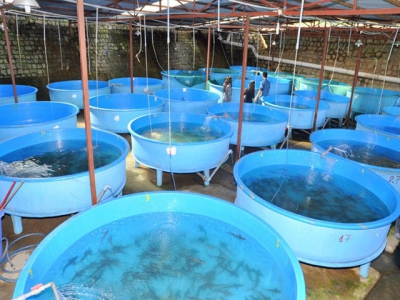US RAS organization calls for feed research, alternatives to ocean-based fish farming

Feed innovation and supporting the use of recirculating or land-based fish farming are focus areas for the Recirculating Farms Coalition, says non-profit founder.
Photo ©GettyImages/ duybox
Although the coalition was initially formed to address a legislative push to expand ocean-based farming of finfish, the group has been more focused on supporting the growth and use of land-based aquaculture, often in conjunction with hydroponics, said Marianne Cufone, founder and executive director of the Recirculating Farms Coalition (RFC).
“Many of the people I worked with … expressed concerns about offshore finfish aquaculture and we started looking for an alternative to offer in the US,” she told FeedNavigator of the organization’s start. “What else could we do that might have less impact on the environment? On fishing communities and coastal communities? We [discovered] recirculating aquaculture or RAS, and we found [out] that it has been combined with hydroponics for aquaponics.”
Feed innovation
There are questions that still have to be answered for producers using recirculating aquaculture systems, said Cufone. One remaining challenge is to improve the kind of feed used and assess ingredients.
“It’s one of our biggest challenges no matter what system you use,” she said. “I know people who have experimented with growing small fish to feed their carnivorous fish – or black soldier fly larvae or worms and algae.”
Commercially available feeds also have some room for improvement and the supply of fishmeal has to be addressed, she said. “Feed is an area that needs improvement, and it is an area of great opportunity moving forward.”
“There are a lot of opportunities to work on feed and it’s very necessary,” she said, adding, “We’re focused on feeding natural food to the fish – it’s akin to cows eating grass.”
Additionally, there is not a “handbook” for RAS production of fish, said Cufone. Producers in the US have had to learn what works best for their species and region.
“That has both made the industry grow slower but also grow smarter,” she said. “You learn what works for you and what your limitations are. There are things that work in New York City that don’t work in Louisiana.”
However, there has been a growing momentum in the production industry, she said. And there continues to be expanding awareness of RAS use.
Since the group started outreach efforts regarding the use of recirculating systems, there also has been a change in the way that farmed fish is discussed, said Cufone.
“A lot of people associated farmed fish with a negative connotation,” she said. “People are learning that it depends on how the fish is farmed and where the fish is farmed.”
Recirculating systems
Recirculating systems do not have some of the challenges that ocean-based fish farming does, said Cufone
As fish are raised in a private space, not a public resource, there can be less overlap with other activities, like competition with local fishing communities, she said. Recirculating systems also provide the chance to limit some types of resource use – like energy and water.
“The farm that we have in New Orleans, the [fish tanks] are made of wood, and sand, and concrete and dug into the ground to get a geothermic benefit,” she said. “If you compare that kind of system with what is necessary to be out in the ocean – transportation, and fuel, and the cages and [maintenance] – it’s a lot of work and expensive.”
RFC raises catfish for consumption and ornamental species for educational purposes, she said. The setup allows for water to be cleaned through a hydroponics growing system and then return to the fish tanks.
“We don’t need to add chemicals or antibiotics – we just feed the fish,” said Cufone. In an offshore setup, there is a risk that fish will escape and disease challenges can mean the need for antibiotic use, which ends up in the water, she added.
Ocean-based fish farming concerns
The Recirculating Farms Coalition recently was among the groups speaking against proposed federal legislation to support or expand ocean-based fish farming. The environmental and aquaculture organizations involved also sent a letter to Congress highlighting concerns about ocean-based fish farming.
“Ocean fish farming was suggested 10 years ago and we were formed to offer an alternative … and that’s still where we are today,” she said. “I feel like we’re refighting many of the same battles.”
“We wanted to raise awareness that it was coming – there are a lot of issues at the federal level right now and it would be easy for this to sneak under the radar,” she said of the current legislation. “But we noticed, and we are concerned. We’re sending letters and petitions so people are aware.”
Related news
Tools

Phối trộn thức ăn chăn nuôi

Pha dung dịch thủy canh

Định mức cho tôm ăn

Phối trộn phân bón NPK

Xác định tỷ lệ tôm sống

Chuyển đổi đơn vị phân bón

Xác định công suất sục khí

Chuyển đổi đơn vị tôm

Tính diện tích nhà kính

Tính thể tích ao




 EFSA reviews environmental risk from hiking levels of…
EFSA reviews environmental risk from hiking levels of…  Insect meal, oil show potential for partial fishmeal,…
Insect meal, oil show potential for partial fishmeal,…